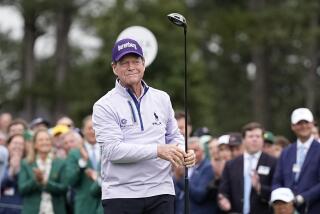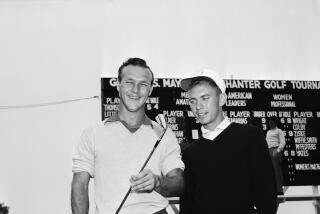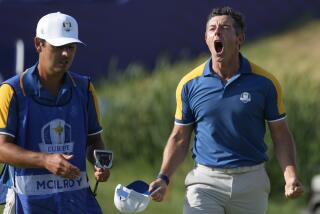Stockton Hits the Road for Ryder Cup : Golf: Captain of U.S. team waves the flag, hopes to regain the trophy.
LA QUINTA — Normally at this time of year, Dave Stockton would be planning to fly to Zambia to hunt exotic African game. Or he might be fishing the Great Barrier Reef in Australia. At the least, he’d settle for shooting elk in the mountains of Colorado.
All of which, Stockton, an avid sportsman as well as professional golfer, managed to squeeze into his schedule in 1990.
He is spending most of 1991 traveling the highways and byways of America, talking up the United States’ participation in golf’s Ryder Cup, which will be played Sept. 26-29 at Kiawah Island, S.C. It is an absorbing task, and he has a proprietary interest. Stockton is the captain of the U.S. team seeking to regain the trophy it lost to the Europeans three Ryder Cups ago.
“I’m giving this year to (the Ryder Cup),” he said. “If they had told me to go to Timbuktu (to promote it), I’d have done it. I want to help people know what the Ryder Cup is about, get out to the back roads of America and let them know what it means to us.”
So what does it mean, this biennial competition in which the 12 best U.S. golfers are pitted against Europe’s top 12, for the solid gold trophy put up by Samuel A. Ryder, a British seed merchant, in 1927?
“First of all,” said Stockton, a two-time Ryder Cup player (1971 and ‘77), “you’re not playing for money; you’re playing for memories. You’re playing for when they strike up the national anthem and say, ‘Now representing the United States, such and such a player . . . ‘
“You’re playing for your pride and your team’s pride and your country’s pride.
“Guys can’t help but being caught up in the Ryder Cup,” Stockton said. “They take you to the White House before you leave to play. The President’s patting you on the back and telling you, ‘Go get ‘em.’ ”
The American team won 13 consecutive competitions and lost only four times in 48 years before a European team won the Cup at the Belfry Golf Club in England in 1985. The supremacy of the U.S. pros was taken for granted. Of course, a change in the format in 1979, expanding the overseas team to include players from the Continent as well as the British Isles, stacked the deck for the Europeans because it brought into play such excellent golfers as Seve Ballesteros of Spain and Bernhard Langer of Germany. Europe won again in 1987 at Muirfield Village, Ohio, and retained the Cup in ’89 by virtue of a 14-14 tie at Belfry, when a succession of Americans hit balls into a lake on the 18th hole.
So, Stockton was named by the PGA of America to replace Raymond Floyd as captain. Ryder Cup leaders have traditionally been taken from a pool of past PGA champions. Only two captains since the 1950s, Arnold Palmer and Billy Casper, have not won the PGA Championship.
Ten of Stockton’s players will make the team through points earned on the PGA Tour. The reigning PGA champion qualifies if he’s an American. Stockton gets to pick the last one or two players. He also decides who plays with whom in the team competition, a tricky job of matching styles.
“You have alternate-shot play and then you have best-ball,” he said. “I want to know who likes to play with each other and whose talents blend. In alternate shots, you have to play guys who think alike. I remember, I was paired with (Jack) Nicklaus in the ’71 Ryder Cup, the only match I lost. I hit as good a drive as I could, which left me with a 4-iron. Jack said, ‘I always hit a 9-iron here.’ We made a poor alternate-shot team. I’m putting him places he’s never been. It wasn’t a good mesh; we got killed. They put J.C. Snead in with Nicklaus, and they killed (the British). In best-ball, you pair a (Fred) Couples with a (Tom) Kite.”
But essentially, Stockton leads the cheers and gets a free briefcase and a nice golfing outfit for his troubles. The players are paid $4,000 each. So why would someone who is a distinguished pro with career earnings of more than $1.27 million want to be the unpaid captain of a Ryder Cup team?
“The two times I’ve played on the team are the most thrilling things that have ever happened to me,” Stockton said. “The ceremonies, the event itself, they’re so big in our minds as players. Being captain is the biggest honor in golf I can get.”
Bigger than the PGA Championship, which he won in 1970 and ‘76?
“The PGA is something I won,” he said. “This is something given to me because of who I am. It tells me maybe I did something right. Maybe I am a nice guy.”
Born and raised in San Bernardino, he was the middle man in three generations of golfing Stocktons. Dave and his father were the first father-son All-Americans in the same sport at USC. Dave Jr., a budding pro, also gained All-American honors, and they were all captains of the Trojan golf team.
In his 28 years on the PGA Tour, Stockton won 11 tournaments--including three in 1974, when he earned $155,105 to finish sixth on the money list--and established a reputation as a fine putter, with a chronically bad back that limited his length on fairways.
“I think I’ve gotten 100% out of what my ability would allow me to have,” he said. “I don’t putt as good as I used to, but I still putt extremely well. I could have won one Masters, the one (Gary) Player won in 1974. I had a two-shot lead going into the last round. I tied for second.”
This year’s Cup matches were originally planned for PGA West in La Quinta, which would have suited Stockton just fine because he lives little more than an hour up the road near Redlands, in Mentone, where he has 450 avocado and orange trees on five acres. But the matches were switched to the new seaside links in South Carolina because of television. The three-hour time differential between the West and East coasts would have precluded live telecasts to Europe.
“I think Kiawah Island (a Landmark Co. development) has a chance to be the best golf course in America,” Stockton said. “People take that with a grain of salt because they know I also represent Landmark. But I’ve never seen a piece of land like it. (There are) 2 1/2 miles of ocean frontage, not more than 350 to 400 yards between the saltwater and the marshes. And they’ve raised up the backside so you can see the ocean from all 18 holes. It’s breathtaking.
“It’s what a golf course should be. It’s a links course. There’s going to be a bunch of bump-and-runs. More rough would be to our advantage, and I’ve been at loggerheads with (course designer) Pete Dye because I want more rough than they’re intending to grow.”
Kiawah Island has also been criticized as a Ryder Cup site.
“There should be criticism,” Stockton said, “for the Ryder Cup being played on a new course, in an area that doesn’t have an overabundance of facilities for a nationwide event that commands worldwide attention. And at the time we’re playing, it’s the highest tide of the year, in the middle of the hurricane season.”
That doesn’t dampen his enthusiasm, however. He will bring rain gear. And when it’s over, he will get back to golf as usual. Stockton, who turns 50 about a month after the Ryder Cup competition, is looking forward to the Senior PGA Tour.
And maybe in 1992, he can start planning another safari.
More to Read
Go beyond the scoreboard
Get the latest on L.A.'s teams in the daily Sports Report newsletter.
You may occasionally receive promotional content from the Los Angeles Times.










